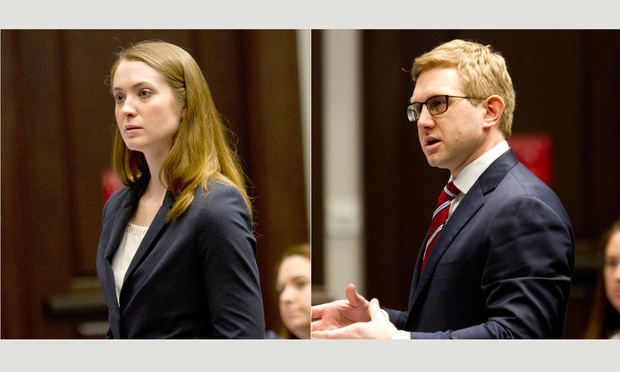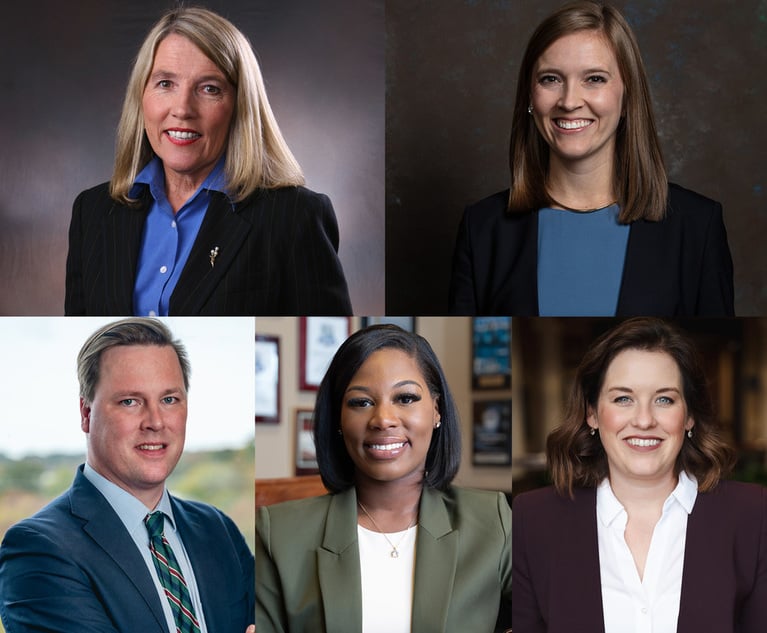How Breastfeeding Came Before Georgia's High Court
"Lactation consultants are not medical professionals," Renee Flaherty of the Institute for Justice told the Georgia Supreme Court. "It's something far more modest. It's woman to woman advice about breastfeeding. They've done this safely for hundreds of years."
January 15, 2020 at 03:08 PM
4 minute read
 Renee Flaherty (left) and Andrew Pinson. (Photos: John Disney/ALM)
Renee Flaherty (left) and Andrew Pinson. (Photos: John Disney/ALM)
It was an unusual topic for the Georgia Supreme Court, to be sure. But for 40 minutes Tuesday morning, the justices—eight men and one woman—discussed who should be qualified to help women learn to "do what they've done since the dawn of time," in the words of Justice Sarah Warren.
The lone woman justice was talking about "The Womanly Art of Breastfeeding," as it is called in the title of the bestselling book by the La Leche League on why it's important and how to do it. The international nonprofit organization was founded in 1956 during an era when breastfeeding fell out of favor and formula-makers promoted bottle feeding. "Breastfeeding is natural, but it does not always come naturally," as the league put it.
Not every new mother had someone with the experience to help. So to promote the health benefits of breastfeeding, advocates increasingly turned to trained helpers, called lactation consultants.
The reason this subject came to be discussed at the high court is that, in 2015, the Georgia General Assembly decided to license lactation consultants. But the legislators didn't offer licensing for all lactation consultants, just the ones who lobbied for the new law, according to others who filed a lawsuit challenging it. The challengers say the ones who can work under the new law tend to be affiliated with hospitals or doctor groups and have academic degrees and extensive clinical certification. They say the act will prevent the work of a much larger number of women who work individually or with community-based groups—particularly in lower-income neighborhoods—some of whom have more experience.
"Mary Jackson is a lactation consultant with decades of experience, and Reaching Our Sisters Everywhere (ROSE) is the nonprofit she helped found. Together they challenged the constitutionality of Georgia's Lactation Consultant Practice Act. This new law would put hundreds of qualified lactation consultants out of work—it was designed to do just that—and would drastically reduce access to breastfeeding care and advice, particularly in rural Georgia," Jackson said in her brief filed with the Supreme Court appealing from the dismissal of her lawsuit.
Her attorneys include Renee Flaherty of the Institute for Justice in Arlington, Virginia, who argued for her Tuesday; Jaimie Cavanaugh of the Institute for Justice in Minneapolis; and Yasha Heidari of Heidari Power Law Group in Atlanta. Jackson and ROSE are also supported by several national groups filing amicus briefs: Goldwater Institute, Pacific Legal Foundation, Mom2Mom Global, Healthy Children. They argue that the law is an unnecessary government intrusion into private life.
"Lactation consultants are not medical professionals," Flaherty told the court Tuesday. "It's something far more modest. It's woman-to-woman advice about breastfeeding. They've done this safely for hundreds of years."
This law, Flaherty said, would put her client and at least 800 other consultants out of work—unless they stop being paid for their work. "My clients have a right to earn a modest living without undue government influence," she told the justices.
Her clients are suing Georgia Secretary of State Brad Raffensperger, who put the brakes on enforcement of the law while the litigation is sorted out.
Georgia Solicitor General Andrew Pinson argued in favor of the law at the high court Tuesday. Pinson's job is a hot one in Georgia. He has only three predecessors. They all went from there to the Georgia Supreme Court. One, Britt Grant, has already moved again, to the U.S. Court of Appeals for the Eleventh Circuit. The other two—Justice Nels Peterson and Warren—were there Tuesday asking Pinson a barrage of questions about why the state has a need to regulate and license lactation consultants. They asked both lawyers for any instance of a case of "lactation fraud" or public health harm done by such consultants, and got no answers in return.
Chief Justice Harold Melton asked Pinson if he could "give us some examples of rogue lactation consultants."
"What's going on that we're trying to fix?" Melton asked.
Pinson replied that this is "hands-on" work, involving "undressing and weighing infants" and "undressing" and "manipulation of the mother."
Then Pinson moved on to potential "undiagnosed health issues" such as "untreated abscesses or blocked ducts."
At that point, his immediate predecessor as solicitor general, Warren, interrupted him.
"If a woman has a 105 degree fever," Warren said, "I hope she just calls a doctor."
The case is Jackson v. Raffensperger, No. S20A0039.
This content has been archived. It is available through our partners, LexisNexis® and Bloomberg Law.
To view this content, please continue to their sites.
Not a Lexis Subscriber?
Subscribe Now
Not a Bloomberg Law Subscriber?
Subscribe Now
NOT FOR REPRINT
© 2025 ALM Global, LLC, All Rights Reserved. Request academic re-use from www.copyright.com. All other uses, submit a request to [email protected]. For more information visit Asset & Logo Licensing.
You Might Like
View All

Plaintiffs Attorneys Awarded $113K on $1 Judgment in Noise Ordinance Dispute
4 minute read
'Didn't Notice Patient Wasn't Breathing': $13.7M Verdict Against Anesthesiologists
12 minute readTrending Stories
- 15th Circuit Considers Challenge to Louisiana's Ten Commandments Law
- 2Crocs Accused of Padding Revenue With Channel-Stuffing HEYDUDE Shoes
- 3E-discovery Practitioners Are Racing to Adapt to Social Media’s Evolving Landscape
- 4The Law Firm Disrupted: For Office Policies, Big Law Has Its Ear to the Market, Not to Trump
- 5FTC Finalizes Child Online Privacy Rule Updates, But Ferguson Eyes Further Changes
Who Got The Work
J. Brugh Lower of Gibbons has entered an appearance for industrial equipment supplier Devco Corporation in a pending trademark infringement lawsuit. The suit, accusing the defendant of selling knock-off Graco products, was filed Dec. 18 in New Jersey District Court by Rivkin Radler on behalf of Graco Inc. and Graco Minnesota. The case, assigned to U.S. District Judge Zahid N. Quraishi, is 3:24-cv-11294, Graco Inc. et al v. Devco Corporation.
Who Got The Work
Rebecca Maller-Stein and Kent A. Yalowitz of Arnold & Porter Kaye Scholer have entered their appearances for Hanaco Venture Capital and its executives, Lior Prosor and David Frankel, in a pending securities lawsuit. The action, filed on Dec. 24 in New York Southern District Court by Zell, Aron & Co. on behalf of Goldeneye Advisors, accuses the defendants of negligently and fraudulently managing the plaintiff's $1 million investment. The case, assigned to U.S. District Judge Vernon S. Broderick, is 1:24-cv-09918, Goldeneye Advisors, LLC v. Hanaco Venture Capital, Ltd. et al.
Who Got The Work
Attorneys from A&O Shearman has stepped in as defense counsel for Toronto-Dominion Bank and other defendants in a pending securities class action. The suit, filed Dec. 11 in New York Southern District Court by Bleichmar Fonti & Auld, accuses the defendants of concealing the bank's 'pervasive' deficiencies in regards to its compliance with the Bank Secrecy Act and the quality of its anti-money laundering controls. The case, assigned to U.S. District Judge Arun Subramanian, is 1:24-cv-09445, Gonzalez v. The Toronto-Dominion Bank et al.
Who Got The Work
Crown Castle International, a Pennsylvania company providing shared communications infrastructure, has turned to Luke D. Wolf of Gordon Rees Scully Mansukhani to fend off a pending breach-of-contract lawsuit. The court action, filed Nov. 25 in Michigan Eastern District Court by Hooper Hathaway PC on behalf of The Town Residences LLC, accuses Crown Castle of failing to transfer approximately $30,000 in utility payments from T-Mobile in breach of a roof-top lease and assignment agreement. The case, assigned to U.S. District Judge Susan K. Declercq, is 2:24-cv-13131, The Town Residences LLC v. T-Mobile US, Inc. et al.
Who Got The Work
Wilfred P. Coronato and Daniel M. Schwartz of McCarter & English have stepped in as defense counsel to Electrolux Home Products Inc. in a pending product liability lawsuit. The court action, filed Nov. 26 in New York Eastern District Court by Poulos Lopiccolo PC and Nagel Rice LLP on behalf of David Stern, alleges that the defendant's refrigerators’ drawers and shelving repeatedly break and fall apart within months after purchase. The case, assigned to U.S. District Judge Joan M. Azrack, is 2:24-cv-08204, Stern v. Electrolux Home Products, Inc.
Featured Firms
Law Offices of Gary Martin Hays & Associates, P.C.
(470) 294-1674
Law Offices of Mark E. Salomone
(857) 444-6468
Smith & Hassler
(713) 739-1250







